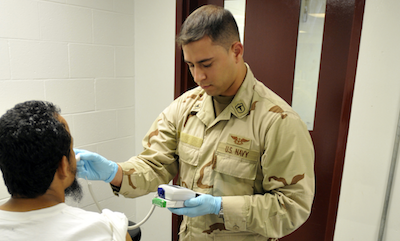Military Physicians’ First Ethical Obligation Is to Patients.

In 2011, the Assistant Secretary of Defense tasked the Defense Health Board with putting together a report on medical ethics for military physicians. The board submitted their guidelines in 2015, affirming that a military physician’s “first ethical obligation is to the patient.” As of today, these guidelines have still not been implemented.
In a new Journal of the Royal Army Medical Corps review article, two School of Public Health researchers urged the Department of Defense (DoD) to finally implement the Ethical Guidelines and Practices for US Military Medical Professionals.
“The future should be one in which military physicians never question that they are physicians first, bound by universal medical ethics,” wrote George Annas, William Fairfield Warren Distinguished Professor of health law, ethics & human rights, and Sondra Crosby, associate professor of health law, ethics & human rights.
The proposed guidelines say that the DoD should ensure that military healthcare professionals are held to the same universal ethical standards as their civilian counterparts, Annas and Crosby explained. The guidelines also say commanding officers “should excuse health professionals from performing medical procedures that violate their professional codes of ethics.”
One problem with current DoD guidelines, Annas and Crosby wrote, is that they treat hunger strikes as suicide attempts, which justifies involuntary medical intervention including forced feeding. The World Medical Association, however, has a clear ethical policy prohibiting physicians from force-feeding competent hunger strikers, calling it “inhuman and degrading treatment.”
“To the best of our knowledge, this is the only time US military medical ethics standards have been adopted that explicitly permit physicians in the military to act in a manner that contravenes applicable worldwide medical ethics standards,” Annas and Crosby wrote.
Official military medical ethics should not remain “in limbo” like this, they wrote. They urged the Department of Defense to officially adopt and formally implement the long-overdue guidelines that its own Defense Health Board put forward in 2015, affirming and protecting military physicians’ universal ethical obligations.
Comments & Discussion
Boston University moderates comments to facilitate an informed, substantive, civil conversation. Abusive, profane, self-promotional, misleading, incoherent or off-topic comments will be rejected. Moderators are staffed during regular business hours (EST) and can only accept comments written in English. Statistics or facts must include a citation or a link to the citation.